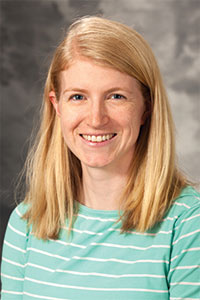Michele Malloy, MD (SMPH ’15, Madison ’18), realized that family medicine was the specialty for her before she even got to medical school.

Madison alumna Michele Malloy, MD, has had interests in community-based women’s health since before entering medical school.
As an undergraduate at the University of Wisconsin-Madison, she was fascinated by the science of cancer mechanisms. She double-majored in biomedical engineering and Spanish, and thought she might become an oncologist.
But while serving as an Americorps member at Sixteenth Street Community Health Centers in Milwaukee, she worked closely with certified nurse midwives to support the Centering Pregnancy program, which provides group prenatal visits for pregnant women, and develop patient educational materials for women’s health.
“I really liked the continuity of taking care of a woman when she’s pregnant, being with her during the birth process, and supporting her as she feeds her baby, raises the child and grows her family,” she recalls.
An Emerging Interest in Women’s Health
While a first-year student at the UW School of Medicine and Public Health (SMPH), she met Anne Eglash, MD, a DFMCH clinical professor, co-founder of the Academy of Breastfeeding Medicine (ABM) and international expert on breastfeeding.
Dr. Eglash invited her to help develop a new ABM clinical protocol on managing persistent pain with breastfeeding. It was the beginning of a mentoring relationship that continues today.
Related Link: ABM Clinical Protocol #26 (Persistent Pain with Breastfeeding)
Dr. Malloy and Dr. Eglash are co-authors on an ABM clinical protocol that provides evidence-based guidance for diagnosing, evaluating and managing breastfeeding women with persistent nipple and breast pain. The protocol was published in the March 2016 issue of Breastfeeding Medicine.
For more information about this and other ABM protocols, visit bfmed.org/protocols.
In her third year, Dr. Malloy entered the SMPH’s Training in Urban Medicine and Public Health (TRIUMPH) program, which focuses on medically underserved urban populations and health disparities.
She also co-led Medical Students Offering Maternal Support (MOMS), an SMPH program in which students partner with pregnant women who have limited community support through pregnancy, labor and birth. She worked to organize the MOMS curriculum so it would provide comprehensive information that students might not otherwise get, in a sustainable structure they could easily access.
Sharing Knowledge
In 2015, Dr. Malloy began residency at the DFMCH’s Madison program and established her continuity clinic at the UW Health Northeast Family Medical Center.
There, she created dot phrases, problem lists, notes templates and educational materials in the electronic health record (EHR) to structure breastfeeding assessment and support for patients.
“[The EHR optimizations] cue physicians on breastfeeding topics and make them aware of available resources,” she explains. “It’s a way to work with the system to improve it.”
With DFMCH Associate Professor (CHS) Jennifer Edgoose, MD, MPH, she also engaged with community leaders and patients on ways to empower breastfeeding women, especially those of color.
And in March 2016, the clinical protocol on breastfeeding pain she began in medical school with Dr. Eglash was published in the journal Breastfeeding Medicine.
“The key to a successful community collaboration is to focus on the community’s assets and goals.”
—Madison alum, new faculty member Michele Malloy, MD
A Community Focus
Today, Dr. Malloy is a DFMCH clinical assistant professor, practicing family medicine with obstetrics at the UW Health Odana Atrium Clinic in Madison.
She still collaborates with Dr. Eglash, and by early 2019, plans to offer lactation-specific care in her clinic one half-day per week.
“I’ve learned that the key to a successful community collaboration is to focus on the community’s assets and goals,” she says. “Stakeholders, priorities, successes and barriers can all shift, so I respect that this work takes time.”
Published: November 2018
